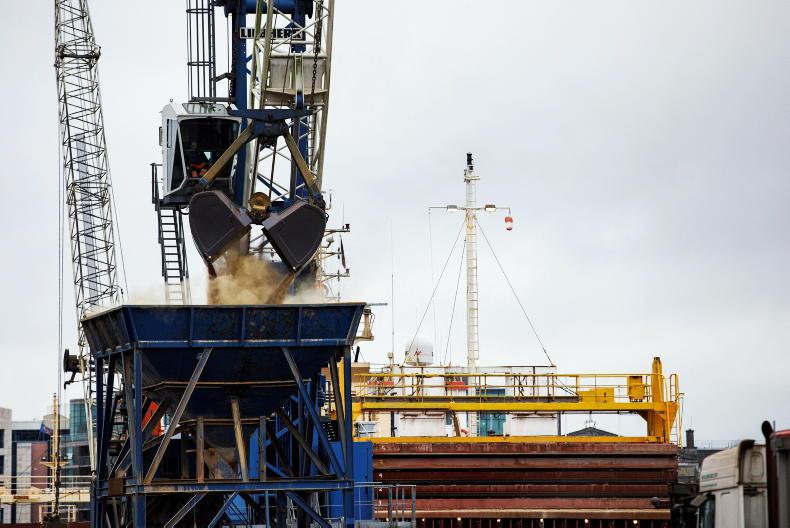Irish farmers face potential feed price hikes as boatloads of animal feed ingredients destined for Ireland will be diverted to the UK in the coming days and weeks.
The Irish Farmers Journal understands that a boat carrying up to 25,000t of beet pulp from the US to Ireland faced diversion to the UK this week.
The diversion was an attempt to avoid levies of 25% due on the product as a result of retaliation from the EU in the ongoing EU-US WTO aircraft dispute 2020/1646.
If urgent action is not taken, more tariffs are set to follow on upcoming orders.
The Irish Grain and Feed Association (IGFA) has said that “the phone number on the feed bags responsible for any possible price increase will be 1800 Kildare Street”.
Speaking on behalf of the association, Deirdre Webb told the Irish Farmers Journal: "Ultimately, unless the ministers and department officials are held responsible, Irish farmers will continue to pay.”
Levies
The levies apply to beet pulp and molasses and the disruption comes as the industry is in the middle of the peek feeding period.
It is also worth noting that these are two ingredients which were more widely available in this country until 2006, when the Irish sugar industry was closed down, and now freight and logistics costs from the US are as cost competitive as parts of the EU.
Cost of €2m this month alone
Deliveries of ingredients such as this are organised months in advance, particularly this year, as the feed industry stockpiles ahead of Brexit and navigates the logistical challenges of the COVID-19 pandemic.
The IGFA estimates that if tariffs of 25% are to be paid, the costs on both commodities would be over €2m to the industry this month alone.
Cancellation penalties will also be costly for logistics contracts, port space and shipping freight, which are all booked in advance.
These costs will filter down through the trade, feed merchants and, ultimately, to the farmer.
“We are requesting both ministers [agriculture and trade] to contact the European Commission urgently and support our request to consider a practical and informed interpretation of Article 3 of the regulation,” the IGFA stated.
Delay in relaying information
The IGFA has questioned the delay in relaying any information to the industry and claims that the Department of Agriculture received notification of these tariffs on 26 October 2020.
The association contacted Minister Leo Varadkar at the Department of Enterprise, Trade and Employment on 17 November, urging him to seek flexibility from the commission to allow existing purchase commitments to be honoured.
Read more
EU hits back with tariffs on US tractors and wheat
No-deal Brexit will cause €690m drop in farm incomes – Teagasc
Greencore boss confident of no Brexit tariffs and UK economic recovery
Irish farmers face potential feed price hikes as boatloads of animal feed ingredients destined for Ireland will be diverted to the UK in the coming days and weeks.
The Irish Farmers Journal understands that a boat carrying up to 25,000t of beet pulp from the US to Ireland faced diversion to the UK this week.
The diversion was an attempt to avoid levies of 25% due on the product as a result of retaliation from the EU in the ongoing EU-US WTO aircraft dispute 2020/1646.
If urgent action is not taken, more tariffs are set to follow on upcoming orders.
The Irish Grain and Feed Association (IGFA) has said that “the phone number on the feed bags responsible for any possible price increase will be 1800 Kildare Street”.
Speaking on behalf of the association, Deirdre Webb told the Irish Farmers Journal: "Ultimately, unless the ministers and department officials are held responsible, Irish farmers will continue to pay.”
Levies
The levies apply to beet pulp and molasses and the disruption comes as the industry is in the middle of the peek feeding period.
It is also worth noting that these are two ingredients which were more widely available in this country until 2006, when the Irish sugar industry was closed down, and now freight and logistics costs from the US are as cost competitive as parts of the EU.
Cost of €2m this month alone
Deliveries of ingredients such as this are organised months in advance, particularly this year, as the feed industry stockpiles ahead of Brexit and navigates the logistical challenges of the COVID-19 pandemic.
The IGFA estimates that if tariffs of 25% are to be paid, the costs on both commodities would be over €2m to the industry this month alone.
Cancellation penalties will also be costly for logistics contracts, port space and shipping freight, which are all booked in advance.
These costs will filter down through the trade, feed merchants and, ultimately, to the farmer.
“We are requesting both ministers [agriculture and trade] to contact the European Commission urgently and support our request to consider a practical and informed interpretation of Article 3 of the regulation,” the IGFA stated.
Delay in relaying information
The IGFA has questioned the delay in relaying any information to the industry and claims that the Department of Agriculture received notification of these tariffs on 26 October 2020.
The association contacted Minister Leo Varadkar at the Department of Enterprise, Trade and Employment on 17 November, urging him to seek flexibility from the commission to allow existing purchase commitments to be honoured.
Read more
EU hits back with tariffs on US tractors and wheat
No-deal Brexit will cause €690m drop in farm incomes – Teagasc
Greencore boss confident of no Brexit tariffs and UK economic recovery









SHARING OPTIONS